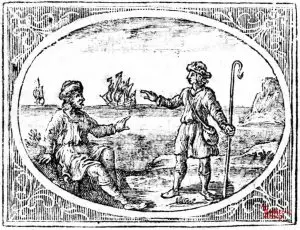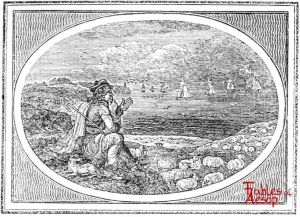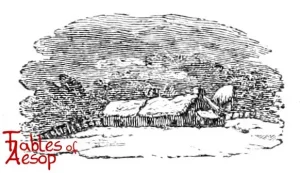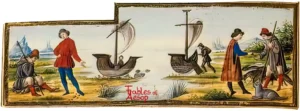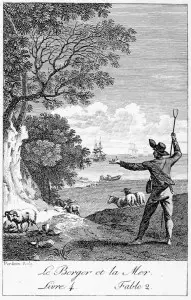A Shepherd saw the calm seas and wanted to sail. He sold his Sheep and got some dates to sell overseas. His ship sank in a tempest and he lost everything.
Understand what you are doing before you do it.

Townsend version
A shepherd, keeping watch over his sheep near the shore, saw the Sea very calm and smooth, and longed to make a voyage with a view to commerce. He sold all his flock, invested it in a cargo of dates, and set sail. But a very great tempest came on, and the ship being in danger of sinking, he threw all his merchandise overboard, and barely escaped with his life in the empty ship. Not long afterwards when someone passed by and observed the unruffled calm of the Sea, he interrupted him and said, “It is again in want of dates, and therefore looks quiet.”

JBR Collection (The Shepherd Turned Merchant)
A Shepherd that kept his Sheep at no great distance from the sea, one day drove them close to the shore, and sat down on a rock to enjoy the cool breeze. It was a beautiful summer day, and the ocean lay before him, calm, smooth, and of an enchanting blue. As he watched the white sails, and listened to the measured plash of the tiny wavelets on the pebbled beach, his heart thrilled with pleasure. “How happy,” exclaimed he, “should I be if, in a tight, trim bark of my own, with wings like a bird, I could skim that lovely plain, visit other lands, see other peoples, and become rich in ministering to their wants and pleasures!” He sold his flock, and all that he had, bought a small ship, loaded her with dates, and set sail. A storm arose: the cargo was thrown overboard to lighten the ship, but in spite of all efforts she was driven upon a rock near the shore, and went to pieces. The Shepherd narrowly escaped with his life, and was afterwards glad to earn his bread by watching the flock which had formerly been his own. In the course of time, when, by care and frugality, he had again become possessed of some amount of wealth, he happened to find himself sitting on the self-same rock, and on just such another day as that on which he had resolved to become a Merchant. “Deceitful and tempting element!” cried he to the sea; “in vain you try to engage me a second time. Others may confide their treasure to your treacherous care, but never, while I live, will I trust thy faithless bosom more.”

Samuel Croxall (The Shepherd turned Merchant)
A SHEPHERD that kept his sheep near the sea, one clear summer’s day, drove them close to the shore, and sat down upon a piece of a rock to enjoy the cool breeze that came from the water. The green element appeared calm and smooth; and Thetis, with her train of smiling beautiful nymphs, seemed to dance upon the floating surface of the deep. The shepherd’s heart thrilled with secret pleasure, and he began to wish for the life of a merchant. O how happy, says he, should I be, to plow this liquid plain, in a pretty tight vessel of my own! and to visit the remote parts of the world, instead of sitting idly here, to look upon a parcel of senseless sheep, while they are grazing! Then what ample returns should I make in the way of traffick, and what a short and certain path would this be to riches and honour! In short, this thought was improved into a resolution; away he posted with all expedition, sold his flock, and all that he had; then he bought a bark, and fitted it out for a voyage; he loaded it with a cargo of dates, and set sail for a mart that was held upon the coast of Asia, five hundred leagues off. He had not long been at sea, before the wind began to blow tempestuously, and the waves to rage and swell; the violence of the weather increased upon him, his ship was in danger of sinking, and he was obliged to lighten her, by throwing all his dates overboard: after this, his vessel was driven upon a rock near the shore, and split to pieces; he himself hardly escaping with life. Poor, and destitute of subsistence, he applied himself to the man who had bought his flock, and was admitted to tend it as a hireling. He sat in the same place as before, and the ocean again looked calm and smooth. Ah! says he, deceitful, tempting element, in vain you try to engage me a second time; my misfortunes have left me too poor to be again deluded the same way; and experience has made me so wise as to resolve, whatever my condition may be, never to trust to thy faithless bosom more.
THE APPLICATION
Bought wit is the best: and the more variety of disappointments we meet with the greater will be our experience, and the better we shall be qualified to rub thro’ the world. Mankind has a strange propensity for things that are new and untried: and so strong a bias inclines them to shifting and changing, that every one disrelishes his own profession, and wishes he had been of some other employment. The young academic, designed to the most grave of all professions, hates to think of his peculiar habit, of that formal, reserved deportment by which he is to separate himself from what he counts the pleasures of the world, and bid adieu to that irregularity which youth so much delights in. He longs for a commission in the army, that he may be fashionably licentious, and indulge himself unquestioned in the wanton sallies of a brisk youthful appetite. In the mean time, the old soldier, harassed out with laborious campaigns abroad, and vexed with the slow returns of his half-pay at home, repines at the happy condition of the ecclesiastic, battening in ease and plenty, and sleeping unmolested in one of the upper stalls of a cathedral. With remorse he calls to mind his former perverseness in quitting a college life, and defeating the purpose of his relations, who had purchased the next reversion of a fat benefice for him. He shakes his head, and reflects, that, if it had not been for his folly, instead of aching limbs, and an empty purse, he might have enjoyed as much leisure and luxury as any priest in the land.
Thus, sometimes with, sometimes without, reason, we are disgusted at our station, and even those who are embarked in another way; which, however it may seem to be a misfortune entailed upon us, yet carries this advantage with it, that, as we are almost sure of being disappointed by a change, we are as certain likewise of gaining some experience by the bargain, and being wiser for the future.

Thomas Bewick (The Shepherd Turned Merchant)
A Shepherd was feeding his flock, on a very fine day, near the sea-side. The beauty of the weather, the smoothness of the water, and the ships with spreading sails floating along its surface, formed altogether so charming a scene, that he lost all relish for a pastoral life; and lured also by the prospect of gain, he determined to quit an employment, which he now despised as yielding neither honour nor profit. He quickly sold off his flocks, and commenced merchant adventurer; and ere long, he embarked with his whole property on the ocean. The ship had not long been at sea before a dreadful tempest arose, which wrecked her and all her cargo; but our merchant and the crew were fortunate enough to escape with their lives. The adventurer having thus lost his all, returned to his former farm, and was glad to hire himself to fhe man who had bought his stock, to attend the sheep which were once his own. One day, as he sat meditating upon the change that had happened, and viewing the sea calm and unruffled as before, Ah! says he, thou deceitful tempting element, experience has made me so wise, that if I should again acquire a property, I will never more trust it upon thy faithless bosom.
APPLICATION.
This Fable is intended to put men of fickle unsettled minds upon their guard against that propensity which often inclines them so strongly to shifting and changing, and leads them to imagine they would be happier in any profession than the one to which they have been brought up. By this disposition they are led away from an honest competency, to adventure their all upon untried schemes, in the hope of bettering their condition. But men of this wavering temper, who are comfortably settled in the world, would do well to reflect, before they change their situation, and rashly venture, perhaps, the acquisitions of their whole life, on projects, the failure of which may subject them to great calamities, which will be the more intolerable to bear, as they will not have adverse fortune to blame, but merely their own folly. Of this truth, experience will convince them when it is too late.

L’Estrange version (A Shepherd Turn’d Merchant)
A countryman was feeding his flock by the seaside, and it was so delicate a fine day, that the smoothness of the water tempted him to leave his shepherds bus’ness, and set up for a merchant. So that in all hast, he puts off his stock; buys a bargain of figs; gets his freight abord, and away presently to sea. It happened to be very foul weather: so that the mariners were fain to cast their whole lading over-bord, to save themselves and the vessel. Upon this miscarriage, our new merchant-adventurer betook himself to his old trade again; and it happen’d one day, as he was tending his sheep upon the very same coast, to be just such a flattering tempting sea again, as that which had betray’d him before. Yes, yes, says he, when the devil’s blind! You’d ha’ some more figs, with a vengeance, wou’d ye?
Moral
Men may be happy in all estates if they will but suit their minds to their condition. A shepherd may be as easy in a cottage, as a prince in a palace, with a mind suited to his station; but if they will be launching out into trade, or bus’ness that they do not understand, they have nothing left them to trust to when they are once bewilder’d but the hope of some kind providence to put them in the right way home again.

Gherardo Image from 1480

de La Fontaine (Le Berger et la Mer)
Du rapport d’un troupeau, dont il vivoit sans soins,
Se contenta long-temps un voisin d’Amphitrite.
Si sa fortune étoit petite,
Elle étoit sûre tout au moins.
A la fin, les trésors déchargés sur la plage
Le tentèrent si bien qu’il vendit son troupeau,
Trafiqua de l’argent, le mit entier sur l’eau.
Cet argent périt par naufrage.
Son maître fut réduit à garder les brebis,
Non plus berger en chef comme il étoit jadis,
Quand ses propres moutons paissoient sur le rivage:
Celui qui s’étort vu Coridon ou Tircis,
Fut Pierrot, et rien davantage.
Au bout de quelque temps il fit quelques profits,
Racheta des bêtes à laine;
Et comme un jour les vents, retenant leur haleine,
Laissoient paisiblement aborder les vaisseaux:
Vous voulez de l’argent, ô mesdames les Eaux,
Dit-il; adressez-vous, je vous prie, à quelque autre:
Ma foi ! vous n’aurez pas le nôtre.
Ceci n’est pas un conte à plaisir inventé.
Je me sers de la vérité
Pour montrer, par expérience,
Qu’un sou, quand il est assuré,
Vaut mieux que cinq en espérance;
Qu’il se faut contenter de sa condition;
Qu’aux conseils de la mer et de l’ambition
Nous devons fermer les oreilles.
Pour un qui s’en loûra, dix mille s’en plaindront.
La mer promet monts et merveilles:
Fiez-vous-y; les vents et les voleurs viendront.

Pastor et Mare
Pastorem, qui gregem suum forte appulisset ad mare, cum cerneret illud stare placidum et quietum, cupiditas incessit navigandi et mercaturas faciendi. Venditis igitur ovibus suis, mercatur palmas et in navem imponit atque ita in altum provehitur. Orta autem tempestate, cum periculum esset ne navis fluctibus deprimeretur, mercibus eiectis in undas, aegre vacua navis fuit conservata. Post dies pauculos, cum ad mare pastor tristis sederet, praetereunte quodam et secum tranquillitatem maris (nam tempestas abierat) admirante, “Ego,” inquit pastor, “scio quid sibi velit haec maris tranquillitas, nam alias palmas profecto quaerit quas devoret.”
Moral
Fabula docet malis acceptis homines cautiores in posterum reddi solere.
Perry #207
